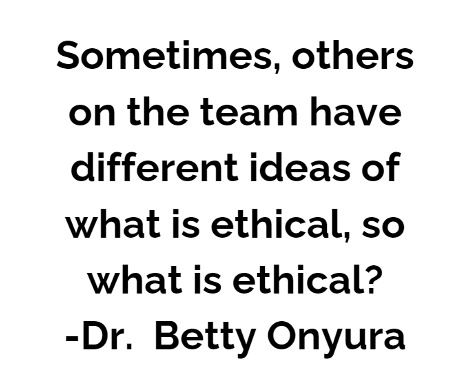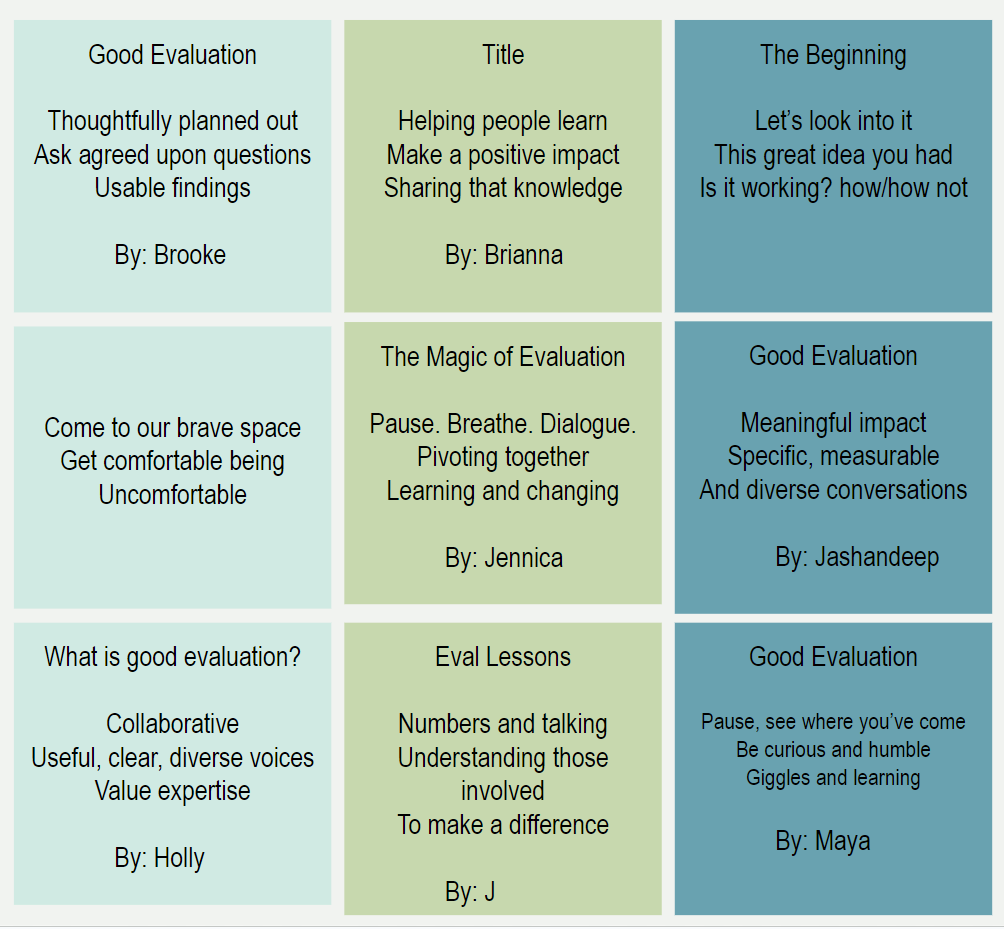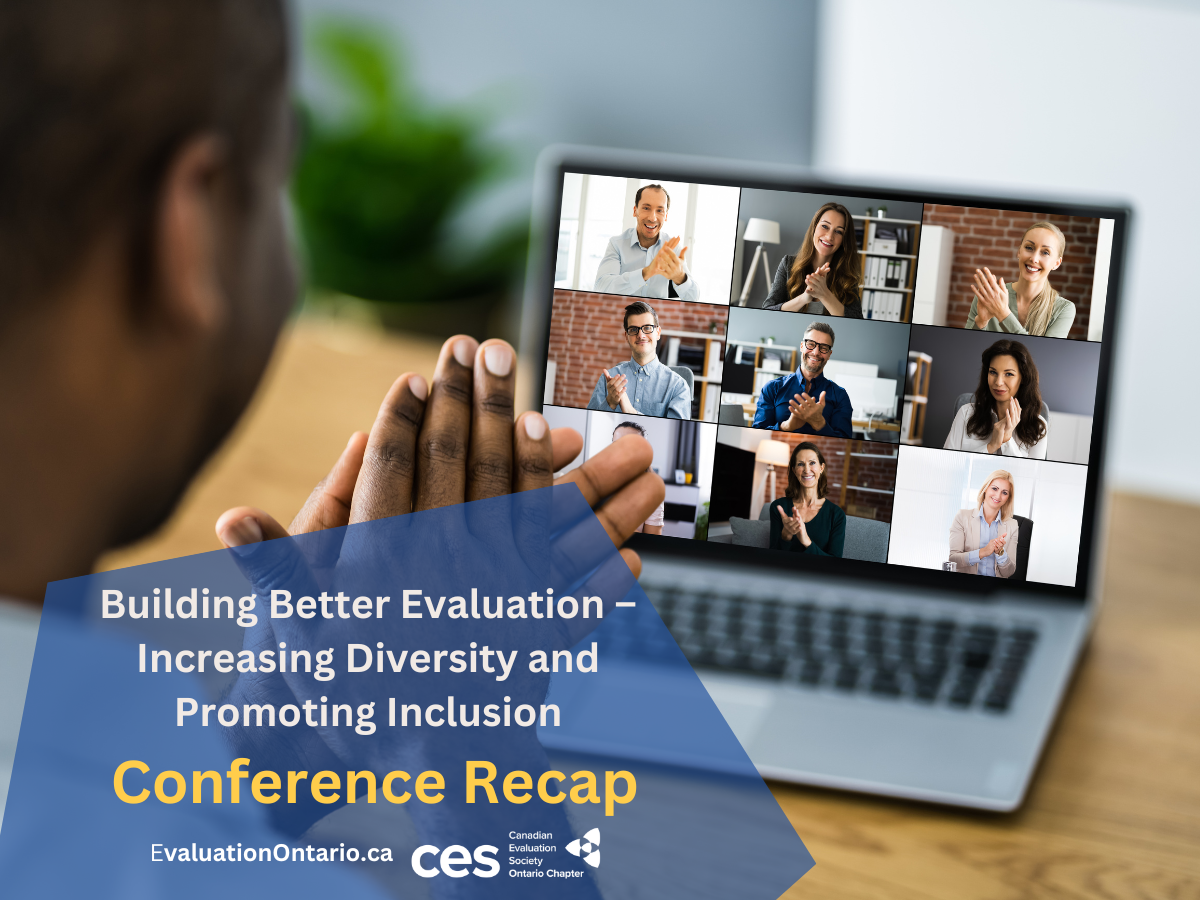Highlights and Lessons from our 2023 CES-ON Conference
What is ethical in evaluation? What can be done if different members of a team have differing ideas about ethics and how to respond to arising ethical dilemmas? Is it possible to develop and grow diversity, equality, inclusivity, and anti-oppression (DEIAO) in our evaluation work before having answers to those two questions?
These questions were the bedrock of our conference as we worked to Build Better Evaluation. Our goal was to identify practical ways to move forward with the answers.
We had an amazing lineup of experts to help us on this journey!
Our speakers highlighted some of the current gaps that exist in today’s evaluation practice (it would take multiple conferences to identify them all) and equipped attendees with better ways to assess and improve evaluation projects and practices.
Conference Highlights
The day opened with a keynote speech by Dr. Betty Onyura, who explored the question, ‘What is ethical?’
She noted that for diverse teams, different team members can have different answers to that question. Dr. Onyura shared exclusive findings from her new research that hasn’t even been released yet! In this sneak peek on navigating ethical questions in evaluation practice, she began by raising some important questions:
- How do we reach a consensus on what, exactly, is ethical?
- How we decide what is important or not important?
- How do we decide what is of value?
All good evaluators love frameworks, so to help evaluators to answer some of those complex questions, Dr. Onyura set out to do just that: create a framework to evaluate complex moral situations. Her research will be released in the December issue of the Canadian Journal of Program Evaluation, and our upcoming blog post where we’ll take a deep dive into her work.

Diversifying data collection and increasing inclusion reveal the bigger picture
In their panel session, Dara Dillon and Christine Cassar offered great insights to how considering diversity and inclusion in evaluation actually leads to stronger research results.
They spoke about the need to engage diverse and underrepresented stakeholder groups through digital tools and crowdsourcing methods. They emphasized the importance of reaching equity-seeking groups, and eliminating language as a barrier to inclusion and data collection.
They also cautioned about the importance of data accessibility – that is, when data are collected, who controls access to that information, and who will benefit?
The panel shared a case study of a project designed to allow migrants to gain long-term residence permits. At first glance, the project’s evaluation showed it to be a success – but from an equity and inclusion perspective, the findings raised deeper questions about access to information and the systemic exclusion of some demographic groups. The study was a lesson in the importance of considering which participants to seek input from, and how to obtain that input in a fair, consensual, and culturally considerate manner.
Better evaluation through poetry
A unique session this year explored the use of poetry for evaluation and reflexive practice by Jennica Nichols and Maya Lefkowich of AND Implementation.
Through actually penning some poetry (image below), many were surprised that poetry – and especially haikus – could be such an effective tool for:
- Reflecting on evaluation findings
- Getting through blockages
- Obtaining feedback that wouldn’t have arisen through traditional methods
- Getting to know the participants of an evaluation project
- Cutting the tension
Sometimes our experiences are hard to put into words, so poetry can help. But we need to remember that arts based reflexive practice can’t be a shortcut to more ethical practice. We still need to pay attention to our relationships and methods.
For those interested in how to use poetry and other arts-based methods in evaluation practices, check out this upcoming online course offered by AND Implementation.

We also heard from several other experts during our conference, including Martha McGuire, Jennifer Fawce, Geetha Van den Daele and Amanda Sunderdas.
What makes us proud of this conference
Among the numerous successes we have reflected on since the conference, one highlight is that everyone had opportunities to practice, reflect and strategize on DEIAO in their evaluation work. We consider the conference as one concrete step in the longer process of building these necessary principles into our evaluation practice.
Participants had space at the end of the day to reflect on their learnings individually and as a group, and to answer key questions: ‘So what?’ and ‘Now what?’ Together they considered how they will implement those new takeaways in their work.
We think this is a great starting point, but recognize that we still have work to do with DEIAO in the Evaluation field. The topic is so big that we could have a conference every week and only be scratching the surface.
We were very pleased that hosting out conference virtually provided an important opportunity for some evaluators who were able to join from Northern and rural Ontario. This low-cost, accessible option made it possible to join without the costs and considerable amount of time that would have been prohibitive for an in-person event.
On a related note, at CES-ON, we have been following the CES National’s conversation on what it means to be environmentally responsible in evaluation work. We want to echo and amplify these values, and feel that we expressed this commitment through the virtual venue. It allowed us to hold our conference without printing materials or travel emissions.

Wrapping it Up!
Big thanks to our Board member and Head of the Planning Committee, Antoine Vandemoortele who did a wonderful job as Master of Ceremonies for this conference!
We are actively recruiting for the co-chair position of our membership committee. If you’d like to help make future conferences a success, this is a great way to do so! Email admin@evaluationontario.ca for more information.
If you missed the conference, don’t fret! We have plans for many posts in our blog and on our LinkedIn and Twitter (X) platforms about moving the Evaluation field in ethical directions for increased diversity, equality, inclusivity and anti-oppression.
And, we have plenty of events coming up with many great opportunities to learn. Check out our events page for more info!
Finally, there are great opportunities to join the conversation by connecting with our LinkedIn Group!
See you soon!

